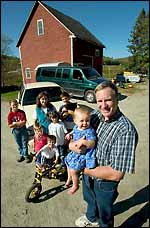|
|

|
|
|
|
|
|
FEELING THE PINCH:
High gas prices are forcing the
Hastings family to take fewer trips in their van, which gets just 10
m.p.g. MELANIE |
No Christmas presents for the Murphy kids.
But that was before gas prices spiked, making fuel costs feel like a second co-pay for this single mother of two. Now that gas takes a 20 percent bite out of her monthly $243 check from Social Security, doctor visits have become a luxury out of reach.
| "I don't monitor my health condition
as well as I should because I just can't afford to get there," Ms.
Murphy says. Meanwhile, she's cut down to one meal per day and has
warned her children to expect nothing under the Christmas tree this
year. Ms. Murphy's quiet struggle plays out far from the public eye. Yet her story is hardly unique in rural America, where wages languish 25 percent below those in urban areas and private transportation is more central to daily life. And with winter just around the corner, costly trade-offs are fast becoming a way of life in places where schools, jobs, and the nearest stores all require a lengthy trip behind the wheel. A September report from the Consumer Federation of America paints a painful picture. Households earning less than $15,000 are spending 10.4 percent of their income on gasoline in 2005, up from 8.2 percent in 1999 and far above the 1.9 percent spent by households earning more than $80,000. The fraction spent on gasoline in rural households is 50 percent larger than the one in urban households. So when gas prices rise, few are hit harder than the 7.5 million Americans living in rural poverty. "The rising gas prices are going to cause people real economic hardship" in rural areas, says Timothy Slack, a Louisiana State University sociologist who has studied the rural poor. Many, however, are reluctant to seek help, he adds. "Especially in rural areas, independence and self- sufficiency are important values. Reaching out to government and saying, 'My family and I can't make it' - that's hard." Pleas for assistance are nevertheless on the rise. Earlier this year, the Salvation Army in Fergus Falls, Minnesota, received so many requests for gasoline vouchers that it began limiting distribution to people with medical emergencies. Here in Littleton, Catholic Charities has received 20 requests for gasoline vouchers in the past month, up from an average of 10. And as gas eats up dollars, some seem to be seeking relief elsewhere in their budget. The food pantry supply stock at Barneveld Lutheran Church in Barneveld, Wisc., used to last a month. Now, it's gone within a week. As prices hover near $3 per gallon, the poor aren't the only ones seeking relief. At eRideShare.com, the number of car-pool seekers jumped from a record high of 34 in one day to more than 200 on multiple days in September. In rural West Virginia, participation in a carpooling program for state employees nearly doubled in September; 85 now take part. Marie Butler of Parkersburg is one of them. She saves $175 per month on an 86-mile one-way trip each day to Charleston. |
www.csmonitor.com | Copyright © 2005 The Christian Science Monitor. All rights reserved.